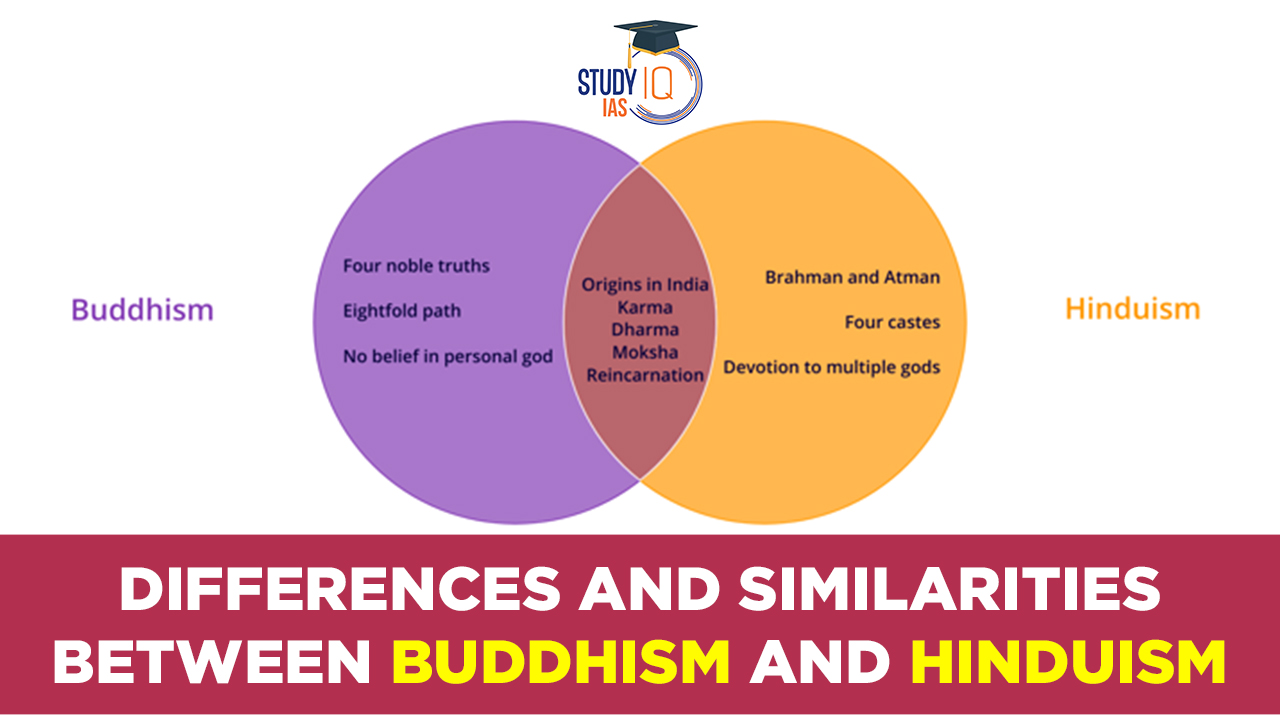Table of Contents
Buddhism and Hinduism are two of the oldest and most complex religious traditions in the world. While they share some similarities, they also have distinct differences. Here are some key points of Differences and Similarities Between Buddhism and Hinduism.
We’re now on WhatsApp. Click to Join
Buddhism and Hinduism
Hinduism, one of the world’s oldest religions, traces its origins to ancient India and lacks a singular founder, evolving over millennia by assimilating diverse cultural elements. Its sacred texts, including the Vedas, Upanishads, Bhagavad Gita, and epics like the Ramayana, embody its rich spiritual heritage. Hindus may embrace monotheism, polytheism, or pantheism, venerating deities like Brahma, Vishnu, Shiva, and Devi. Central tenets include the cycles of reincarnation (samsara) and karma, with the ultimate goal being moksha—liberation from the cycle of rebirth.
In contrast, Buddhism, emerging in the 6th century BCE with Siddhartha Gautama in Nepal, crystallized around his enlightenment. Rejecting a caste system, Buddhism emphasizes equality on the path to enlightenment. The Tripitaka, Mahayana sutras, and other texts form its scriptures, while Nirvana represents the liberation from suffering and the cycle of birth and death. The Noble Eightfold Path guides practitioners toward enlightenment through right understanding, intention, action, and mindfulness, with places of worship including monasteries and stupas.
Differences Between Buddhism and Hinduism
| Buddhism | Hinduism | |
| Founder and Origin | Siddhartha Gautama in 6th century BCE, Nepal | Evolved over thousands of years in ancient India |
| Concept of God | Generally non-theistic; focus on enlightenment | Can be monotheistic, polytheistic, or pantheistic; major deities like Brahma, Vishnu, Shiva, Devi |
| Sacred Texts | Tripitaka, Mahayana sutras, Tibetan texts | Vedas, Upanishads, Bhagavad Gita, Ramayana, Mahabharata, Puranas |
| Cycle of Birth and Rebirth | Samsara with emphasis on breaking the cycle through enlightenment (Nirvana) | Samsara and karma; actions in this life affect future lives |
| Ultimate Goal | Nirvana (liberation from suffering) | Moksha (liberation from the cycle of rebirth) and reunification with the divine |
| Paths to Liberation | Noble Eightfold Path (right understanding, intention, speech, action, livelihood, effort, mindfulness, concentration) | Various paths, including Jnana Yoga (knowledge), Bhakti Yoga (devotion), Karma Yoga (selfless action), Dhyana Yoga (meditation) |
| Places of Worship | Monasteries, shrines, stupas | Temples |
| Caste System | Rejects the caste system, advocates equality | Historically structured around a caste system; ongoing efforts for reform or transcendence |
| Attitude towards Vedas | Rejects the authority of the Vedas | Considers Vedas important |
| Foundational Beliefs | Four Noble Truths and Eightfold Path | Embraces diversity in beliefs and practices; wide range of interpretations and rituals |
Buddhism
- Followers: Known as Buddhists.
- Global Population: Approximately 520 million, constituting about 7% of the global population.
- Places of Worship: Buddhist monasteries, shrines, temples.
- Founder: Buddha, considered the all-transcending sage and highest teacher.
- Spiritual Leadership: Dalai Lama in Tibetan Buddhism, associated with the Yellow Hat or Gelug school.
- Monastic Titles: Male Monks – Bhikkhus, Female Monks – Bhikkhunis; Monastic Communities – Sangha.
- Branches: Hinayana (Theravada) and Mahayana.
- Primary Language: Theravada uses Pali; Mahayana and Vajrayana use Sanskrit.
- Important Festivals: Vesak, Parinirvana Day, Buddha Purnima, Ullambana, Uposatha, Losar.
- Sacred Texts: Tripitaka, Gandhara Texts.
- Symbols: Conch, Dharmachakra, fish, lotus, vase, victory banner, parasol.
- Marriage and Celibacy: Advice on maintaining a happy married life, but marriage not a religious duty; monks and nuns follow celibacy.
Hinduism
- Followers: Known as Hindus.
- Global Population: Approximately 1.25 billion, constituting about 16% of the global population.
- Places of Worship: Temples.
- Founder: Evolved over time with diverse cultural and religious elements.
- Spiritual Leadership: No concept of a foremost spiritual leader.
- Monastic Titles: Male Monks – Yogis, Sages, Rishis, Gurus, Priests; Female Monks – Sanyasini, Sadhvi, Swamini.
- Denominations: Shaktism, Shaivism, Vaishnavism, Smartism.
- Primary Language: Sanskrit; most works of Hindu Philosophy written in Sanskrit.
- Important Festivals: Ganesh Chaturthi, Mahashivaratri, Ram Navami, Krishna Janmashtami, Navaratri, Durga Puja, etc.
- Sacred Texts: Vedas, Bhagavad Gita, Ramayan, Upanishads, Puranas.
- Symbols: Om, Swastika, etc.
- Marriage and Sin: Marriage allowed; historical instances of polygamy. Sins committed deliberately repaid through Karmic consequences; repentance for unintentional sins prescribed.
Origins and Goal
- Buddhism originated from Buddha, achieving enlightenment at Bodh Gaya in Bihar, India, in 563 B.C.E.
- Hinduism began in the Indian subcontinent, predating 3000 B.C.E.
- Buddhism aims for lasting, unconditional happiness.
- Hinduism’s goal is freedom from the cycle of birth and rebirth, ultimately attaining moksha or liberation.
Geographical Distribution
- Buddhism followers found in Asian countries like India, Nepal, Japan, Cambodia, Myanmar, Sri Lanka, Singapore, Laos, Thailand, Bhutan.
- Hinduism mainly followed in India, Nepal, Bhutan, Mauritius, the Caribbean, North America, Bali in Indonesia.
Similarities Between Buddhism and Hinduism
Buddhism and Hinduism share several similarities, as both originated in the Indian subcontinent and have been influenced by the cultural and philosophical traditions of the region. Here are some key similarities between Buddhism and Hinduism:
Origin and Cultural Context
Both Buddhism and Hinduism originated in ancient India, and they share a common cultural and historical background.
Dharma
Both religions emphasize the concept of dharma, which refers to the moral and ethical duties and responsibilities that individuals should uphold in their lives.
Karma
Both Hinduism and Buddhism believe in the concept of karma, which is the law of cause and effect. According to this concept, the consequences of one’s actions (good or bad) will affect them in this life or the next.
Reincarnation (Samsara)
Both religions subscribe to the idea of samsara, the cycle of birth, death, and rebirth. Individuals are believed to be reincarnated into a new life based on their karma from previous lives.
Moksha (Nirvana)
While the terminology differs, both religions share the ultimate goal of liberation from the cycle of birth and death. Hindus seek moksha, the release from samsara, while Buddhists aspire to attain nirvana, a state of liberation from suffering and desire.
Concept of Self (Atman/Anatta)
Hinduism traditionally teaches the existence of an eternal, unchanging self (atman), while Buddhism rejects the idea of a permanent self (anatta). Despite this difference, both agree on the impermanence of worldly phenomena.
Four Noble Truths
Buddhism’s foundational teachings, encapsulated in the Four Noble Truths, outline the nature of suffering, its origin, the possibility of cessation, and the path leading to the cessation of suffering. While not directly present in Hinduism, the themes of suffering and the quest for liberation are shared.
Eightfold Path
Buddhism presents the Eightfold Path as a guide to achieving nirvana, comprising ethical and mental practices. Hinduism also emphasizes ethical and moral conduct, as seen in the paths of dharma and righteousness.
Meditation and Mindfulness
Both traditions advocate the practice of meditation and mindfulness as essential tools for spiritual development and self-realization.
Respect for All Life
Both Buddhism and Hinduism promote non-violence and the idea of compassion and respect for all living beings.
Differences Between Buddhism and Hinduism UPSC
Buddhism and Hinduism, originating in ancient India, differ fundamentally in their perspectives on the self. Hinduism asserts the existence of an eternal self (atman) amid the cycle of reincarnation, seeking liberation (moksha) within a divine cosmic order. In contrast, Buddhism rejects a permanent self (anatta) and focuses on extinguishing desire to attain nirvana, liberation from suffering. Hinduism accommodates diverse deities and rituals within a hierarchical caste system, while Buddhism emphasizes a non-theistic approach and rejects caste distinctions. Despite shared cultural roots, these religions diverge in core concepts, emphasizing distinct paths to spiritual enlightenment and ultimate liberation.


 Ancient Buddhist Site Discovered in Kash...
Ancient Buddhist Site Discovered in Kash...
 Poompuhar Port: Ancient Sangam-Era Marit...
Poompuhar Port: Ancient Sangam-Era Marit...
 UNESCO World Heritage Sites of India Lis...
UNESCO World Heritage Sites of India Lis...

























